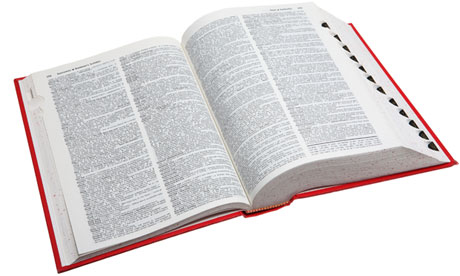Well, no, but the redefinition of 'literally' leaves it in a rather awkward state. Perhaps it's a word best avoided for the moment

The English language … slipping out of our control? Photograph: Alamy
It's happened. Literally the most misused word in the language has officially changed definition. Now as well as meaning "in a literal manner or sense; exactly: 'the driver took it literally when asked to go straight over the traffic circle'", various dictionaries have added its other more recent usage. As Google puts it, "literally" can be used "to acknowledge that something is not literally true but is used for emphasis or to express strong feeling".
Did we, as genuinely hundreds of people are tweeting, just break the English language? Or did we, as totally tens of bloggers are writing, prove that the English language is a beautiful, organic creature that is forever slipping out of our control? Well, no: to be precise, we have done something mildly annoying.
"Literally", you see, in its development from knock-kneed, single-purpose utterance, to swan-like dual-purpose term, has reached that awkward stage. It is neither one nor the other, and it can't do anything right. So to use it at all is to encounter one of several pitfalls:
"Literally" has been playfully abused since the time of Walter Scott. In Chronicles of the Canongate, for example, he writes: "The house was literally electrified; and it was only from witnessing the effects of her genius that he could guess to what a pitch theatrical excellence could be carried." This was 1827, before the popularisation of the electric light: the house was figuratively electrified.
In 1837, a piece in The Mother's Magazine by Abigail and Samuel Whittelsey contained the phrase, "They both literally slept in Jesus", and in 1894 Sir Arthur Conan Doyle wrote, in The Memoirs of Sherlock Holmes, that Sherlock's room "was literally ankle-deep with congratulatory telegrams" (we can probably also take this as figurative).
The point is that even if it was fun and surprising to force a "literally" where another word should go back in the 1800s, it's getting a bit old now. But not quite old enough to change the word's meaning completely and clean it of all the irritatingly playful associations.
Plus, since then the word has picked up way too much baggage to make it usefully nifty. "Literally" has been mainstream shorthand for "talking like a teenage girl" for a decade – you're not going to get rid of that reference without violent verbal acrobatics. Literally, I'm afraid, is, like, totally eighteen-hundred and late.
More
Did we, as genuinely hundreds of people are tweeting, just break the English language? Or did we, as totally tens of bloggers are writing, prove that the English language is a beautiful, organic creature that is forever slipping out of our control? Well, no: to be precise, we have done something mildly annoying.
"Literally", you see, in its development from knock-kneed, single-purpose utterance, to swan-like dual-purpose term, has reached that awkward stage. It is neither one nor the other, and it can't do anything right. So to use it at all is to encounter one of several pitfalls:
1. Mucking about with its meaning isn't clever or inventive any more
"Literally" has been playfully abused since the time of Walter Scott. In Chronicles of the Canongate, for example, he writes: "The house was literally electrified; and it was only from witnessing the effects of her genius that he could guess to what a pitch theatrical excellence could be carried." This was 1827, before the popularisation of the electric light: the house was figuratively electrified.
In 1837, a piece in The Mother's Magazine by Abigail and Samuel Whittelsey contained the phrase, "They both literally slept in Jesus", and in 1894 Sir Arthur Conan Doyle wrote, in The Memoirs of Sherlock Holmes, that Sherlock's room "was literally ankle-deep with congratulatory telegrams" (we can probably also take this as figurative).
The point is that even if it was fun and surprising to force a "literally" where another word should go back in the 1800s, it's getting a bit old now. But not quite old enough to change the word's meaning completely and clean it of all the irritatingly playful associations.
Plus, since then the word has picked up way too much baggage to make it usefully nifty. "Literally" has been mainstream shorthand for "talking like a teenage girl" for a decade – you're not going to get rid of that reference without violent verbal acrobatics. Literally, I'm afraid, is, like, totally eighteen-hundred and late.
More
